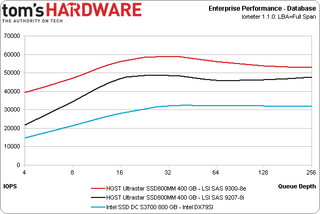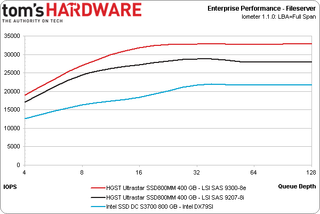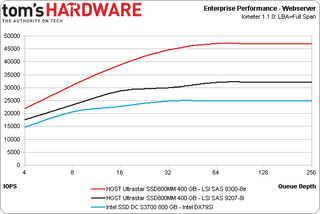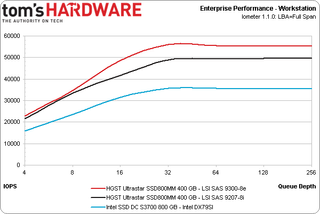LSI SAS 9300-8e & HGST Ultrastar SSD800MM: 12 Gb/s SAS, Tested
With the announcement of LSI's SAS 9300-8e and HGST's Ultrastar SSD800MM earlier this year, the world was officially introduced to 12 Gb/s SAS. Today we get our first look at how two times the interface bandwidth translates to real-world performance.
Results: Enterprise Workload Performance
Our next set of tests simulates different enterprise-oriented workloads, including database, file server, Web server, and workstation configurations.
Because LSI's SAS 9300-8e and Intel's native SATA controller treats the SSD DC S3700 so similarly, we're only showing the X79 chipset's results as reference at 6 Gb/s.
The database workload (also categorized as transaction processing) involves purely random I/O. Its profile consists of 67% reads and 33% writes using 8 KB transfers.

The file server workload consists of 80% reads at varying transfer sizes.

The Web server test generates 100% reads at varying transfer sizes.

Our workstation test is 80% reads that are 80% random.

With the SSD800MM capable of generating nearly two times the performance of Intel's SSD DC S3700, you might have guessed the gains that'd show up in our enterprise workloads. Transferring over a 12 Gb/s link, the SSD800MM is consistently 50-100% faster than Intel's 6 Gb/s enterprise drive. Even limited to 6 Gb/s, the SSD800MM is at least 30% faster.
Stay on the Cutting Edge
Join the experts who read Tom's Hardware for the inside track on enthusiast PC tech news — and have for over 25 years. We'll send breaking news and in-depth reviews of CPUs, GPUs, AI, maker hardware and more straight to your inbox.
We usually only see results like these from PCI Express-based add-in cards. In fact, HGST's SSD800MM is only a little slower than Intel's SSD 910. When you consider that $2000 (for a comparable 400 GB model) card came out almost a year ago, it's amazing that a single 2.5" SSD can already come close to catching up.
Current page: Results: Enterprise Workload Performance
Prev Page Results: Performance Consistency Next Page Results: Sequential Performance-
major-error The performance and relative maturity of this prototype drive certainly is impressive, but this is what the enterprise space demands.Reply
At the consumer level though, the article takes on a completely different tone--I would be very surprised if we don't start seeing mention of PCIe4 at/before the top of the next CPU cycle (so, in 24-36 months at most.) -
raidtarded Actually, Adaptec already saturated PCIe 3.0 with 6GB/s. The chart is incorrect, it doesn't take 12Gb/s to saturate the PCIe bus. Well, not for Adaptec.Reply -
falcompsx Remember when mechanical hard drives struggled to saturate their interfaces? Times sure have changed with SSD tech.Reply -
CaedenV Reply11006286 said:The performance and relative maturity of this prototype drive certainly is impressive, but this is what the enterprise space demands.
At the consumer level though, the article takes on a completely different tone--I would be very surprised if we don't start seeing mention of PCIe4 at/before the top of the next CPU cycle (so, in 24-36 months at most.)
Ya, my bet is that we will not start to see SATA4 or PCIe4 until Skymont at the earliest. Considering it is looking like Broadwell may be pushed back due to 14nm die shrink issues I would bet that Skymont will have similar issues when moving to 10nm. But at least for home users you can cram 2 SSDs in RAID0 with a proper RAID card and get a little performance boost until then. I guess the only problem is that most people are going to use the onboard Intel RAID for RAID0, which will get you a killer synthetic benchmark, but in practical reality it is really just expanding your volume with very little speed benefit. -
bit_user * wipes drool off floor *Reply
That's a quality review of some quality products. I like the insights shared, throughout. I especially appreciated the link to the SATA-Express paper. Thanks!
MORE REVIEWS LIKE THIS!!
:) -
bit_user Reply
How many ports and how many lanes, though? If it's just a 8-port card, the math doesn't support that, as 6x8 = 48 Gbps, which is less than the 8 x 8 = 64 Gbps that a x8 PCIe 3.0 slot should carry.11006482 said:Actually, Adaptec already saturated PCIe 3.0 with 6GB/s. The chart is incorrect, it doesn't take 12Gb/s to saturate the PCIe bus. Well, not for Adaptec.
-
raidtarded It is the equivalent of a nuke bomb compared to the LSI products. It has 24 Native ports.Reply11011736 said:
How many ports and how many lanes, though? If it's just a 8-port card, the math doesn't support that, as 6x8 = 48 Gbps, which is less than the 8 x 8 = 64 Gbps that a x8 PCIe 3.0 slot should carry.11006482 said:Actually, Adaptec already saturated PCIe 3.0 with 6GB/s. The chart is incorrect, it doesn't take 12Gb/s to saturate the PCIe bus. Well, not for Adaptec.
Most Popular

